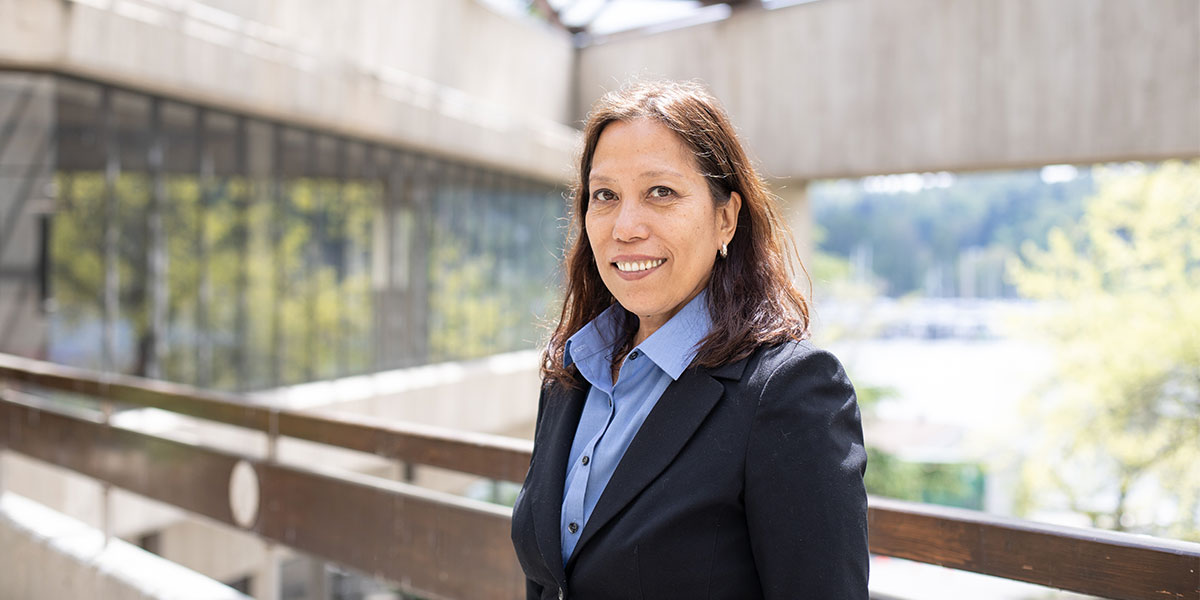
Victoria Gardner’s office is warm.
She has big, south-facing windows that let the sun shine in (when it’s not gloomy), as well as posters and plants that create an inviting space. What emanates a lot of the warmth, though, is her own ease and openness.
Gardner is the assistant dean for equity, diversity and inclusion at the University of Washington School of Public Health. And she needs a space like this to be able to tackle the complex issues that come across her desk and to meet with people who want to share their stories.
In early March, Gardner sat down with a few students who had recently experienced anti-Asian bullying and harassment on campus. Later that same week, she received reports that a customer at a UW cafeteria refused help from a food-service worker who appeared to be Asian.
This all happened just before the UW moved classes online and asked staff and faculty to work from home to help limit the spread of the novel coronavirus in Seattle. First identified in Wuhan, China, in December 2019, the virus has spread to more than 170 countries, including the United States, where its first case was reported in the state of Washington. The World Health Organization (WHO) recognized the outbreak of the 2019 coronavirus disease (COVID-19) as a pandemic on March 11, 2020.
Rise in coronavirus-related xenophobia
As the virus circulated around the world, so too did panic, anxiety and fear that seeped into everyday life – not only influencing toilet paper buying sprees but also exacerbating racism and xenophobia.
“We live in such a racialized society,” Gardner says. “When bad things happen, it's really easy for us to want to blame a specific group of people. It’s not right.”
Research has shown that stereotypes and biases could dictate behavior, and when under pressure, people are more likely to behave in a prejudicial or unfair way. What’s more, “when the power structures in our society reinforce these biases, we may feel that it's OK for us to say and do things without regard to the impact our behavior could have,” Gardner says.
She agrees with other experts that xenophobia has historically been associated with concern over infectious diseases, especially those that are poorly understood or novel. This disease-related racism manifested worldwide during the SARS (severe acute respiratory syndrome) outbreak of 2003 and the more recent Ebola epidemic, among others.
“The virus is not a person,” says Gardner, who then repeats the message from local and state public health departments that “the virus does not discriminate and neither should we.”
Standing up against discrimination
This is easy to say, but what can we do? Gardner emphasizes that “people should educate themselves about what they need to do to stay safe and healthy,” and to get their information from trusted sources such as the WHO, Centers for Disease Control and Prevention, and locally from the Washington State Department of Health and Public Health – Seattle & King County.
It is also important that institutions like the UW and the School of Public Health reject racism, xenophobia and all hateful or intolerant speech and behavior, she says. In a message to students, staff and faculty, Gardner joined the School’s Dean Hilary Godwin to strongly condemn recent racist and xenophobic incidents targeting Asian Americans, especially Chinese Americans.

“For me, the tipping point was hearing that some of our students were feeling unsafe going to the grocery stores by themselves, because they had been subjected to xenophobic outbursts related to the COVID-19 outbreak,” Dean Godwin said. “I wanted them to know that we stand united in rejecting racism and bias in all forms.”
Sometimes it’s enough to let people know that they're supported and that you stand behind them, Gardner adds. The dynamics of social support are a bit trickier now that Governor Jay Inslee has asked all Washington residents to stay home and to keep six feet away from others if they do go outside. However, Gardner believes we can all still be good “upstanders,” and speak up when we see or hear someone being bullied, even while keeping a safe physical distance.
The School is committed to building respectful, safe and inclusive communities, both in person and online. As UW classes move entirely online for spring quarter, Gardner admits it will be more difficult to address discrimination that happens on digital and social media, where people can hide behind hashtags and usernames. Instructors and teaching assistants should make it clear that racist behavior will not be tolerated in their learning environments, she says. If bullying does occur, the problem should be addressed immediately.
Students, staff and faculty can report any instances of discrimination using the School’s anonymous bias concern form. “If it’s something that we can address, we will address it,” Gardner says. Otherwise, the data is collected and used to identify programmatic or policy needs, such as training, that will help address or prevent issues. People can also send an email to dcinfo@uw.edu for a confidential report. (The ‘dc’ refers to Diversity Committee, which Gardner facilitates at the School level.) This method allows her to communicate directly with the sender and act on issues more precisely.
Gardner is also available by phone or Zoom for private or group coaching, and the School is exploring other opportunities to provide support during this difficult time, such as online support groups. To ensure that members of the School community have the resources they need to navigate this new academic life amid a pandemic, Gardner is working closely with other School leaders, including Jared Baeten, vice dean for strategy, faculty affairs and new initiatives; Stephanie Farquhar, acting associate dean for education; and Juanita Ricks, director of program operations for student and academic affairs.
Efforts are also underway in the School's departments and programs. For example, a buddy system in the Department of Biostatistics pairs students up to go grocery shopping together, if they are uncomfortable going alone. In the Public Health-Global Health Major, Asian and Asian American students can take part in an online discussion group to talk about their experiences during this time of heightened anti-Asian sentiment and violence.
Additionally, departments are compiling and disseminating lists of resources to help students, staff and faculty cope with xenophobia both as a person experiencing the harassment and as a bystander.
Building on existing equity, diversity and inclusion initiatives
Gardner has grappled with equity, diversity and inclusion issues for nearly three decades. Since joining the School in March 2018, she has helped to build an organizational framework to address discrimination, including xenophobia, the dislike of people from other countries, and the more elusive and subtle microaggressions. These efforts have provided a strong foundation to stand on as the School continues to cultivate a supportive, positive and inclusive climate during a global health crisis.
Last summer, the School released its Equity, Diversity and Inclusion Roadmap, an action plan that serves as a guide to improve recruitment, retention, curriculum, training and climate. This and other efforts at the School, department and program levels have made it easier to identify issues as they are happening, direct resources where they’re needed and plan for future problems.
“Having this structure is unique, it's very special, which is why I want people to take advantage of the work that we can do together. We have resources that other schools may not have,” Gardner says. These are not always financial resources but approaches that are effective and targeted. For example, professionalism standards, diversity statements, anti-racism curricula and training for faculty search committees are some tangible ways the School is working to improve the climate.
Simply having a person that focuses on equity, diversity and inclusion as part of the School leadership makes a big, important statement, she adds. The School’s commitment to these issues is also reflected in its move to create an Anti-Racism Center for Health. The search for a center director is underway.
“This work is twenty-four seven, 365 days a year,” Gardner says. “It's not to say that microaggressions and conflict doesn't happen. It still happens, even with me here, but we’re getting better every day.”
